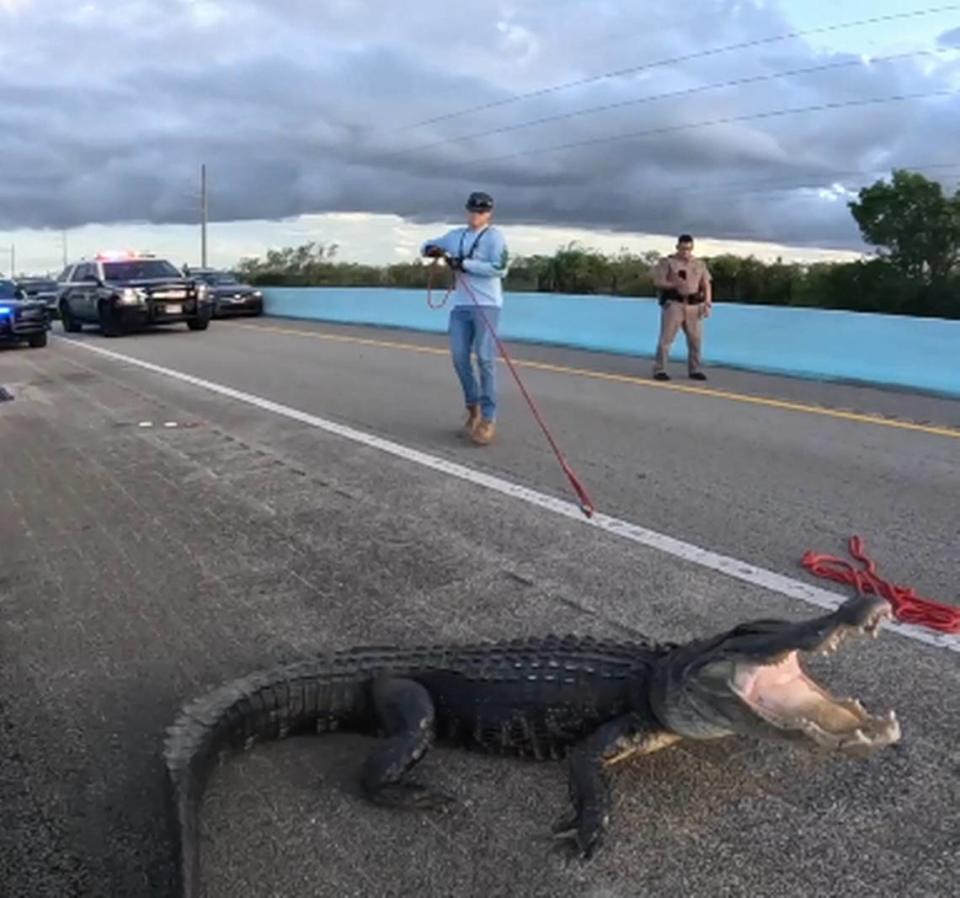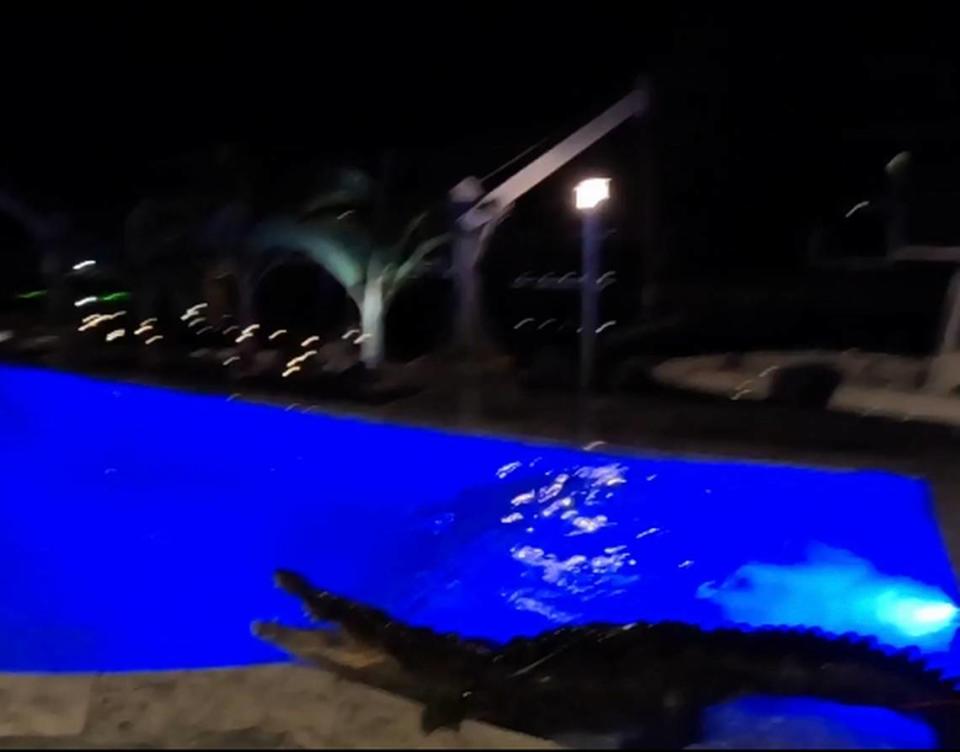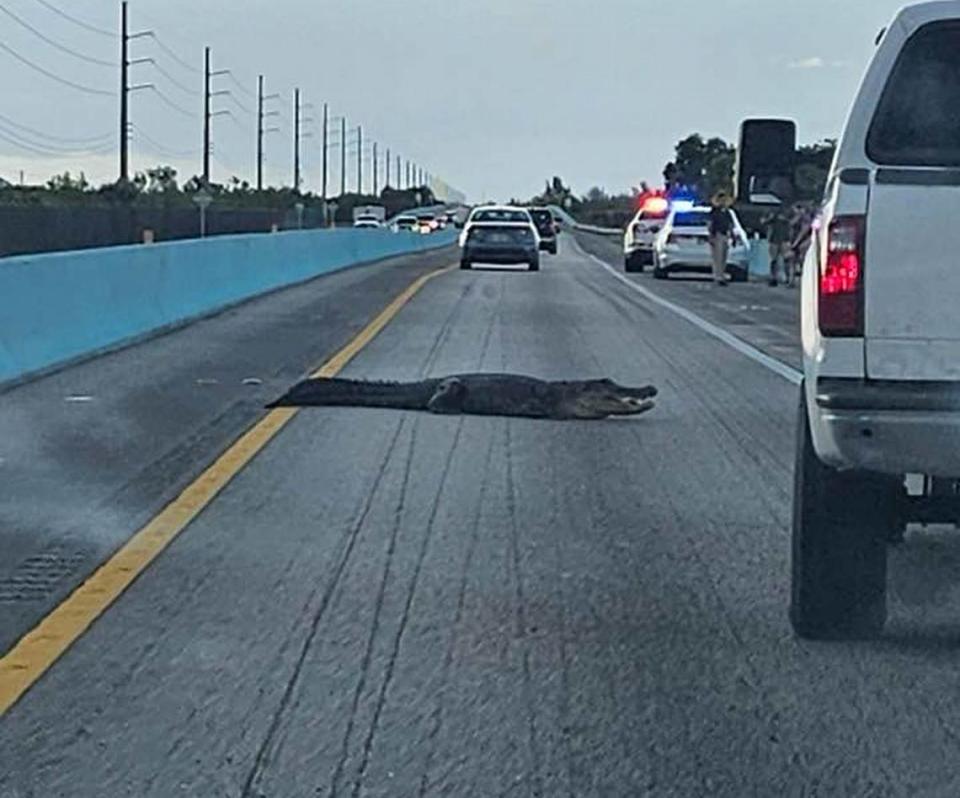From a gator on a Florida Keys highway to a crocodile in a pool. This trapper is in demand
A Florida Keys family called authorities when they found an uninvited guest lounging in their swimming pool early Sunday morning.
This intruder wasn’t human, though. It was a large American crocodile, a reptile native to the Keys that was once near extinction and now reclaiming its natural habitat, mostly in South Florida and the southernmost island chain.
As their population continues to grow, it’s not unusual to see crocodiles in South Florida canals — and, yes, swimming pools.
“One more example in Florida of why everyone should turn on the pool light before they jump in for a swim at night,” Todd Hardwick, a well-known trapper who removed the croc in question after arriving at the Plantation Key home around 2 a.m., told the Miami Herald/FLKeysnews.com.
After the homeowners, who’ve not been named, called the Florida Fish and Wildlife Conservation Commission to report the 10-foot croc, the agency sent Hardwick and his team from Pesky Critters Wildlife Control — the same crew that removed a large alligator that was blocking traffic along the busy 18 Mile Stretch of U.S. 1 days earlier.

A video sent by Pesky Critters shows Hardwick rope the reptile, which fought against capture — rolling in the pool and splashing, creating a slick deck that made the struggle precarious for the trappers.
Hardwick and his assistant trapper Jeff Peterla heaved the croc on the deck and duct taped its mouth shut. American crocodiles are federally protected under the Endangered Species Act as “threatened,” so when they are captured from a home, they are usually released back into the wild or relocated.
With the help of a Monroe County Sheriff’s Office deputy, the trappers brought the crocodile down to a boat ramp located next to the house, removed the tape and the animal swam off into the canal.
“The whole thing went fairly quickly,” Hardwich said. “You don’t want to put a lot of stress on them.”
And that slippery deck that made its capture so tricky? It made it easier for the trappers to pull the croc off the property, Hardwich said.
“He kind of just glided across the patio,” he said.

Locals say the croc is a frequent sight in the area, and the homeowner has no problem with it as long as it stays in the canal and mangroves.
“His only objection was it was in the pool and wanted it to himself,” Hardwick said.
To keep the croc and others in the area off the property, Hardwick pointed out an access area to the yard where he recommended the owner construct a barrier.
“That should solve the problem of the croc going into the pool for a swim in the future,” said Hardwick, who at 60-years-old has been making local and international headlines for his notable wildlife adventures since getting started 42 years ago.
Why aren’t gators usually relocated?
The alligator that Hardwick caught on the 18 Mile Stretch Monday was likely harvested for its meat and hide, he said.
Unlike crocodiles, which, despite their rebounding numbers, are only about 2,000 strong in the state — after being hunted almost to extinction between 1930 and 1960 — alligators have a stable population of about 1.3 million animals that live in all of Florida’s 67 counties, according to the FWC.
Therefore, any gator more than 4 feet long that is deemed to pose a possible threat to people, pets or property, the FWC considers a “nuisance” that is usually killed when removed by trappers.
“The removal of nuisance alligators does not have a significant impact on our state’s alligator population,” the FWC says on its website.

And why not just relocate them? State wildlife officials say it’s usually not effective and can create more issues.
“To avoid creating a problem at the release site, nuisance alligators would need to be relocated to remote areas where they would not encounter people. These remote areas already have healthy alligator populations, and the ones that already live there have established social structures,” the agency says. “The introduction of a new alligator to these areas would likely cause fighting, possibly resulting in the death of a resident alligator or the introduced alligator.”
What’s the likelihood of an attack?
Gator attacks on people and pets are rare in Florida, but they do happen. And, tragically, sometimes people are killed.
However, there has never been a recorded incident in which an American crocodile killed a human in the United States, according to the University of Florida. Unlike their cousins on other continents, American crocodiles are considered timid and typically avoid interacting with people.
Unfortunately, American crocodiles have fatally preyed upon several pets in South Florida in recent years as they, as the FWC puts it, “have reclaimed their historic range.”
Hardwick’s team offered the following advice to people living in South Florida, where their chances of encountering an American crocodile are growing, coinciding with the reptiles’ recovering population:
“Keep a safe distance if you see a crocodile. Be aware that crocodiles often will bask with an open mouth to regulate their body temperature, and there’s no cause for concern if you see this behavior.”
“Swim only in designated swimming areas and only during daylight hours. Crocodiles are most active between dusk and dawn.”
“Keep pets on a leash and away from the water, even designated swimming areas, because they can resemble the crocodile’s natural prey.”
“Pet owners who live on the water where American crocodiles may occur should consider erecting fencing on their property that effectively places a barrier between their pets and crocodiles.”
“Never feed crocodiles — it is illegal and dangerous. When fed, they can overcome their natural wariness and learn to associate people with food.”
“Dispose of fish scraps in designated waste containers because discarding scraps in the water may attract them. Also, avoid feeding other aquatic animals such as ducks because that also can attract crocodiles.”
To report an alligator or crocodile that you think may be a danger to people or pets, call the FWC’s hotline at 866-392-4286 (866-FWC-GATOR).

